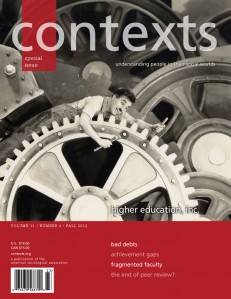
Fall 2012
Volume: 11 | Number: 4
Degree by Default
In past generations, college was thought to be a site for higher learning in America. Yet April Yee's ethnographic research finds that few undergraduates are enrolling for the pursuit of knowledge anymore; instead, students are going to college simply because they believe they must have a degree to have a future in our society. Read More
American Sentimentalism and the Production of Global Citizens
"American Sentimentalism and the Production of Global Citizens" looks at recent trends in the globalization of U.S. higher education through the lens of sentimentalism to expose three dangers: the linking of a certain kind of productivity with global citizenship; the division of the world into global citizens and global subjects; and the illusion that awareness and enthusiasm are sufficient for social change. Social scientist Ron Krabill calls for international education policies that embrace radical reciprocity to overcome these dangers. Read More
Keeping Rank
Sociologist Dana M. Britton examines barriers to advancement in the academy, focusing on long-term associate professors. In particular, she draws attention to the role of "institutional reproduction"—teaching, advising, and service—as a barrier to advancement. Read More
Academic Capitalism
Social scientists have been seeking conceptual terminology that captures how and why universities are engaging in direct and indirect market activity. Sociologist Steve G. Hoffman argues that, in the United States, several key trends have developed from the late 1970s to the present period that warrant the term "academic capitalism." Read More
The (Mis)Education of Monica and Karen
Monica and Karen, two typical in-state students starting college at a mid-tier public university in the Midwest, encounter organizational arrangements best designed to serve affluent, out-of-state partiers who can afford to pay full freight. Sociologists Laura Hamilton and Elizabeth A. Armstrong discuss how Monica and Karen's stories reveal the great mismatch between the needs of most college students and what many four-year residential universities offer. Read More
What Would Jefferson Do?
Sociologist Andrea Press discusses the recent firing of President Teresa Sullivan, the first woman and first sociologist serving this role at the University of Virginia, by Helen Dragas, the first woman rector directing University of Virginia's Board of Visitors. She analyzes the role of gender in these events and also examines the importance of social media in relation to facilitating faculty governance. Read More
Raising Them Right
This body of work explores young motherhood in Chelsea, Massachusetts. Through the combination of photographs and the young mothers’ own words, Amanda Van Scoyoc presents evidence of the complicated reality that is adolescent parenting. Read More
The Education Assembly Line
Experts weigh in on the rise of corporatizing trends in higher education today. Johann N. Neem, Brenda Forster, Sheila Slaughter, Richard Vedder, and Tressie McMillan Cottom and Sara Goldrick-Rab help us understand these trends and their effects on higher education. Read More
Reframing the Achievement Gap
In this interview, Pedro Noguera discusses his insights on the state of public and higher education in the United States. He reflects on how inequality, class, and race play a role in hindering the success in education of marginalized populations. Read More
Pay-to-Play Journals
Many college professors now regularly receive emails soliciting submissions to new journals, with names such as The Journal of Civil … Read More
